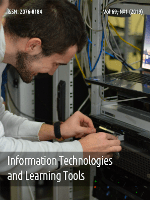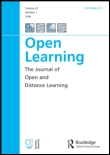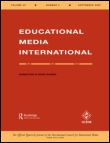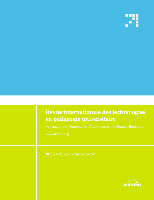
Information Technologies and Learning Tools
Scope & Guideline
Advancing Educational Practices with Cutting-Edge Tools.
Introduction
Aims and Scopes
- Integration of Information and Communication Technologies (ICT) in Education:
The journal emphasizes the role of ICT in enhancing teaching and learning processes across various educational levels, exploring how technology can support curriculum delivery and student engagement. - Artificial Intelligence in Educational Settings:
Research on the application of artificial intelligence tools and methodologies to improve educational practices is a core focus, including studies on AI-driven instructional strategies and personalized learning. - Digital Competence and Skills Development:
The journal addresses the necessity of developing digital competencies among educators and learners, focusing on training programs, curricula, and pedagogical strategies that enhance digital literacy. - E-Learning and Distance Education:
A significant area of research involves the implementation and effectiveness of e-learning platforms and distance education methodologies, particularly in response to global challenges such as the COVID-19 pandemic. - Innovative Educational Software and Tools:
The publication encourages the development and evaluation of new educational software, tools, and applications that facilitate learning and teaching, often through empirical studies and case analyses. - Gamification and Interactive Learning:
Investigations into the use of gamification and interactive learning environments are prevalent, showcasing how these approaches can enhance student motivation and engagement.
Trending and Emerging
- Artificial Intelligence and Machine Learning:
The integration of AI and machine learning in educational practices is a rapidly growing theme, with research focusing on their potential to personalize learning experiences and enhance educational outcomes. - Hybrid and Blended Learning Models:
There is an increasing focus on hybrid learning models that combine online and face-to-face instruction, particularly in response to the needs identified during the pandemic. Studies explore best practices and efficacy in diverse educational settings. - Digital Wellbeing and Student Mental Health:
Emerging research is addressing the implications of digital learning environments on student mental health and wellbeing, recognizing the importance of supporting learners in an increasingly digital world. - Gamification and Student Engagement Strategies:
An upward trend in the exploration of gamification techniques and their role in enhancing student engagement and motivation is evident, showcasing innovative approaches to instructional design. - Cloud-Based Educational Solutions:
Research into cloud-based platforms for educational delivery and management is on the rise, reflecting the growing reliance on such technologies for facilitating remote learning and collaboration.
Declining or Waning
- Traditional Teaching Methods:
Research focusing on conventional teaching methods without the integration of technology has been notably reduced, as the emphasis shifts towards innovative, tech-enhanced pedagogies. - Physical Classroom-Based Learning:
There is a noticeable decline in studies centered on traditional, physical classroom settings, as the journal increasingly prioritizes research that evaluates online and blended learning environments. - Non-Digital Educational Tools:
The exploration of non-digital educational aids and tools has decreased, likely due to the growing prevalence and acceptance of digital resources in educational contexts.
Similar Journals

Computers and Education Open
Empowering educators with innovative insights.Computers and Education Open is a pioneering open access journal published by Elsevier that focuses on advancing the field of educational technology and digital learning methodologies. Since its inception in 2020, the journal has provided a platform for researchers, educators, and practitioners to disseminate innovative findings and share insights related to the integration of computing technologies in educational settings. With its ISSN 2666-5573, this journal aims to bridge the gap between technology and education, fostering a collaborative environment for those dedicated to enhancing learning experiences through computational tools. Leveraging the rigorous standards of Elsevier's publishing excellence, Computers and Education Open attracts high-quality research that influences pedagogical practices and educational policies globally. The open access nature of the journal ensures that valuable knowledge is freely accessible, making it an essential resource for academics and professionals looking to stay at the forefront of educational advancements.

International Journal of Technology in Education
Shaping Tomorrow's Classrooms with Today’s TechnologyThe International Journal of Technology in Education, published by the International Society for Technology Education & Science (ISTES), serves as a vital platform for researchers, educators, and practitioners devoted to the intersection of technology and educational practices. With an E-ISSN of 2689-2758, this journal aims to showcase innovative research, case studies, and theoretical contributions that explore how emerging technologies can enhance teaching and learning. Although specific metrics like impact factor and HIndex are currently unavailable, the journal is committed to rigorous peer review and high academic standards, ensuring that all published work contributes meaningfully to the evolving landscape of educational technology. As an open-access journal, it strives to make research widely available, fostering collaboration and knowledge sharing among its audience. Whether you are a researcher exploring new horizons or a professional seeking practical applications of technology in education, the International Journal of Technology in Education is an indispensable resource.

Journal of Teaching and Learning
Exploring the future of teaching and learning together.The Journal of Teaching and Learning, published by the University of Windsor, Faculty of Education, is a prominent open-access journal in the field of education, dedicated to fostering scholarly discussion and exploration. Since its inception in 2001, it has served as a vital platform for researchers, educators, and practitioners to share innovative insights and evidence-based practices that advance teaching and learning methodologies. With an impact factor reflective of its category quartiles, it currently ranks in the Q3 category for education according to the 2023 evaluation, standing at 834 out of 1543 in Scopus's social sciences education rankings. This journal aims to bridge theoretical frameworks with practical applications, providing a robust resource for those invested in enhancing educational outcomes. With an open-access model, the Journal of Teaching and Learning ensures that its contributions are readily accessible to a global audience, encouraging the dissemination of knowledge and collaborative learning experiences. The journal is published in Canada and welcomes submissions that explore current trends and future directions in teaching practices, learner engagement, and educational policy.

Open Learning
Transforming Learning Through Open DialogueOpen Learning, published by Routledge Journals, Taylor & Francis Ltd, is a leading peer-reviewed journal in the field of education and e-learning, showcasing innovative research and practice since its inception in 1970. With a robust impact factor and consistently ranked in the Q1 category for both education and e-learning by Scopus, this esteemed journal positions itself at the forefront of academic dialogue, exploring the evolving landscape of digital and open learning environments. The journal's authoritative content and empirical studies serve as essential resources for researchers, educators, and students striving to enhance pedagogical strategies and educational outcomes in a rapidly changing technological world. Published quarterly, Open Learning remains committed to cultivating scholarly exchange and advancing knowledge within the global education community.

International Journal of Education in Mathematics Science and Technology
Exploring new horizons in mathematics, science, and technology education.The International Journal of Education in Mathematics Science and Technology (ISSN: 2147-611X, E-ISSN: 2147-611X) is an esteemed publication dedicated to advancing knowledge and research in the fields of mathematics, science, and technology education. Published by Necmettin Erbakan University in Turkey, this journal serves as a vital platform for educators, researchers, and professionals to disseminate innovative methodologies, pedagogical strategies, and educational technologies. With a commendable Q2 ranking in both the Education and Mathematics categories for the year 2022, it clearly exemplifies its impact in these domains, boasting a Scopus rank of #19 out of 74 in Mathematics (miscellaneous) and a position in the 75th percentile. Although the journal has transitioned into open access, it remains committed to fostering a rich dialogue among scholars and practitioners dedicated to enhancing educational outcomes in mathematics and science. Researchers and educators interested in contributing to pedagogical advancements are encouraged to submit their work, thereby playing a part in influencing the future of education.

Educational Media International
Unveiling the future of learning through media exploration.Educational Media International, published by Routledge Journals, Taylor & Francis Ltd, is a premier journal in the interdisciplinary fields of Communication and Education, with a commendable Q2 ranking in both categories as of 2023. Established in 1978, this journal serves as a significant platform for the dissemination of innovative research that explores the evolving intersection of media technologies and educational practices. With an emphasis on both theoretical and practical applications, it addresses crucial topics such as digital learning environments, multimedia educational resources, and the impact of social media on education, making it an essential resource for researchers, professionals, and students alike. Located in the United Kingdom, Educational Media International not only contributes to the academic discourse but also reflects global trends and challenges in education, fostering a deeper understanding of the vital role media plays in shaping learning experiences worldwide.

Magis-Revista Internacional de Investigacion en Educacion
Exploring Innovative Methodologies for Tomorrow's EducatorsMagis-Revista Internacional de Investigacion en Educacion, an esteemed journal published by the Pontificia Universidad Javeriana, Facultad de Educación, has been a vital contributor to the field of education research since its inception in 2008. With its Open Access policy, the journal ensures that valuable research findings are accessible to a global audience, promoting the sharing of knowledge and fostering collaboration among researchers, educators, and students. Currently positioned in the Q3 category in Education and ranked #893 out of 1543 in the Scopus Ranks for Social Sciences in Education, Magis maintains a commitment to advancing scholarly discourse through rigorous peer-reviewed publications. The journal's scope encompasses a wide array of educational topics, reflecting diverse perspectives and innovative methodologies. With a convergence of scholarly efforts until 2024, Magis is poised to play a pivotal role in shaping the future of educational research in Latin America and beyond.

Education and Information Technologies
Pioneering research in educational technology.Education and Information Technologies, published by SPRINGER, is a leading journal dedicated to the intersection of educational practices and innovative information technologies. With an impressive impact factor and consistently ranked in the Q1 quartile across Education, E-learning, and Library and Information Sciences, this journal serves as an essential resource for researchers and professionals aiming to explore the dynamic landscape of educational technology. Spanning from 1996 to 2024, it provides a platform for high-quality, peer-reviewed articles that contribute to the evolving discourse in this critical field. The journal’s rigorous Scopus ranking, placing it in the top 4% of Social Sciences Education and top 6% in Library and Information Sciences, highlights its significance in advancing scholarly knowledge. While it offers various access options, the focus remains on delivering cutting-edge research that can inform teaching practices and technological integration in education, making it indispensable for students, educators, and technology developers alike.

Journal of Computers in Education
Empowering Education through Innovative Technology.The Journal of Computers in Education is a distinguished academic journal published by SPRINGER HEIDELBERG, dedicated to advancing the intersection of technology and pedagogy. With an ISSN of 2197-9987, this journal has established itself as a pivotal resource for researchers and educators alike since its inception in 2019, maintaining a strong focus on innovative applications of computer science within educational contexts. Ranked in the Q1 category in both Computer Science Applications and Education, the journal demonstrates a high impact in its field, holding a remarkable position within the top 1.5% of journals in social sciences (rank #20/1543) and top 5.5% in computer science applications (rank #45/817). The journal's scope encompasses a wide range of topics including but not limited to educational technologies, e-learning methodologies, and the effective integration of computers in teaching, making it an essential source for professionals and students who are keen to explore cutting-edge research and trends. Although access options vary, the journal's commitment to disseminating quality research continues to enrich the academic landscape in Germany and beyond, nurturing the synergies between education and technology.

International Journal of Technologies in Higher Education
Advancing Learning with Innovative Tech SolutionsInternational Journal of Technologies in Higher Education, with ISSN 1708-7570 and E-ISSN 1708-7570, is a distinguished academic platform dedicated to advancing the intersection of technology and pedagogy in higher education. Published by INT JOURNAL TECHNOLOGIES HIGHER EDUCATION, this open-access journal has been at the forefront of educational innovation since 2004, providing researchers, practitioners, and students access to high-quality research without financial barriers. The journal aims to disseminate cutting-edge studies, best practices, and theoretical insights that explore the transformative impact of emerging technologies in the field of education. Situated in Montreal, Canada, the journal serves as a pivotal resource for those committed to enhancing learning environments through technological advancements. By fostering scholarly discussion and collaboration, the International Journal of Technologies in Higher Education plays an essential role in shaping the future of educational practices globally.